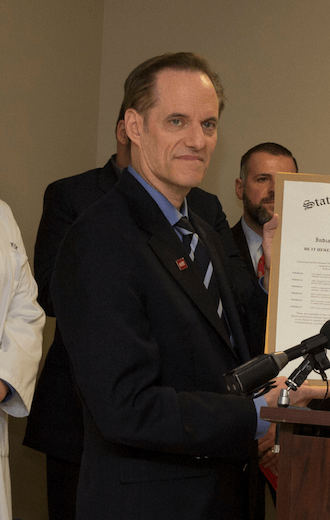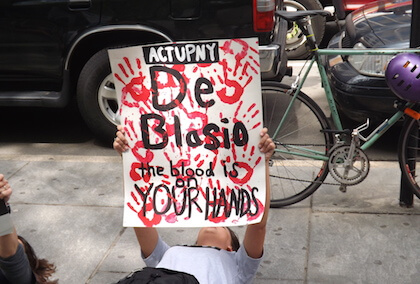AIDS activist Peter Staley was among those who cried foul after Senator Bernie Sanders issued a release about their meeting with him in which he discussed the California AIDS pricing referendum favorably. | SEAN BLACK
BY DUNCAN OSBORNE | In his interview with the ACT UP Oral History Project, Peter Staley recalled that the high price of an AIDS drug motivated him and six other members of the AIDS activist group to briefly stall the opening of the New York Stock Exchange with a protest in 1989.
After sneaking into the exchange with forged IDs, the activists chained themselves to a banister and to each other. Seconds before the opening bell, they set off foghorns and unfurled a banner reading “Sell Wellcome,” a reference to Burroughs Wellcome, the manufacturer and marketer of AZT, then the most expensive anti-HIV drug on the market.
“Burroughs Wellcome and Bristol-Myers were the only two in the game for a while there,” Staley said in his 2006 interview. “And they were viewed, right from the get-go, as gross profiteers, because of the price of AZT, which was set at $10,000 a year, which was the highest price of any drug in history at that time, and just shocked everyone — not just people with HIV— but shocked most of the editorial boards of most newspapers in this country.”
HIV activists charge double-cross in prez contender implying their support for November ballot question
Flash forward 27 years. The cost of prescription drugs has soared and Staley, along with a host of AIDS groups, are opposing a ballot initiative that would require state agencies in California to pay no more for any prescription drug than the lowest price paid for that drug by the US Department of Veterans Affairs (VA), the federal agency that pays the lowest prices for prescription drugs among all federal programs.
The dispute is mired in the people and personalities involved in the initiative, and it may be missing the merits of the proposed law, principally that it might actually lower drug prices.
“Certainly, the VA is the lowest,” said Meredith Rosenthal, a professor of health economics and policy at the Harvard School of Public Health. “I don’t know how much that will reduce drug spending, but my guess is 10 to 15 percent.”
There are unknown factors. Two of the programs that the proposed law would regulate — Medicaid and the AIDS Drug Assistance Program (ADAP) — use a mix of federal and state dollars and are primarily governed by federal law and rules.
“In both cases, you’d have a straight-up legal preemption problem,” said Sara Rosenbaum, a professor of health policy at George Washington University. “The state would find that the drug manufacturers would sue to get the higher price that federal law guarantees… I think, unfortunately, federal law as currently structured would essentially set the standard.”
Vermont Senator Bernie Sanders. | BERNIESANDERS.COM
Previously, AIDS groups in California were quiet in their opposition to the ballot initiative and have declined to join the pharmaceutical industry in fighting it. To date, that industry has raised $68.4 million to defeat the initiative, with $58.8 million of that cash coming from 15 pharmaceutical companies. The AIDS Healthcare Foundation (AHF), the initiative’s sponsor, has raised $4.4 million.
Another concern is that if the initiative passes, pharmaceutical companies would respond by raising prices for buyers who are not using state dollars to purchase prescription drugs. That concern may misconstrue how drug pricing works.
Prescription drugs are patented and have “marketing exclusivity,” Rosenthal said. The companies are generally already charging the highest price they can get. If the price goes higher, consumers will stop buying.
“There’s no way to compensate for it by increasing prices,” Rosenthal said. “While the drug is under marketing exclusivity, they are by definition a monopoly. A monopolist gets to choose how high the price will be. They don’t price infinitely high.”
While AHF says the initiative could save California $4 billion over 10 years if enacted, the Legislative Analyst’s Office, which serves the State Legislature, was unable to calculate any savings because the VA does not publically disclose what it pays for prescription drugs. That could also keep state agencies from being able to determine what the lowest VA price is.
The spat over the initiative began soon after a national coalition of AIDS groups met with Bernie Sanders, the Vermont senator who is vying to be the Democratic nominee for president, on May 25. The groups held a similar meeting with Hillary Clinton on May 12. Following the May 25 meeting, the Sanders campaign issued a press release that took note of the meeting and praised the Drug Price Relief Act, as the initiative is called.
“We think it’s a great start and we applaud the people of California for standing up to the pharmaceutical industry,” Sanders said of the initiative in the release. He had previously endorsed the initiative on May 10.
But AHF is run by Michael Weinstein, a chief executive who is known for striking out on his own and who enjoys inflammatory rhetoric and advertising. His continued opposition to pre-exposure prophylaxis (PrEP), an anti-HIV drug that prevents HIV infection, has made him a pariah among AIDS activists. AHF, which is an advertiser in Gay City News, is also sponsoring a similar ballot initiative in Ohio, though that proposal may not get on the November ballot.
Michael Weinstein, who heads the AIDS Healthcare Foundation, the leading supporter of the drug pricing referendum. | AIDSHEALTH.ORG
The implicit association with AHF in the Sanders statement was too much for the groups and for Staley, who took to his Facebook page, where he has more than 7,600 followers, and announced that he felt “used and abused” by the Sanders campaign. This prompted a back and forth via Twitter between Staley and Warren Gunnels, a senior policy advisor on the Sanders campaign. Staley enjoyed broad support from former ACT UP members, Clinton supporters, and his fans in this fight.
Nineteen of the meeting attendees released a May 27 statement saying they were “deeply concerned” that they had been “exploited for short-term political gain” prior to California’s June 7 Democratic primary.
“Your campaign’s release title and the bulk of its content mislead readers and the press to believe that our May 25 meeting was primarily focused on your endorsement of a California ballot initiative on HIV drug pricing,” the statement said. “By extension, it also implies that our national HIV/ AIDS coalition also fully endorses this initiative. Both these characterizations are inaccurate.”
Activists point to the views of California AIDS groups, such as Project Inform, to explain their opposition to the ballot initiative.
“I’m not familiar with the entire history and how it came about,” Staley told Gay City News. “I think the only way to determine if it has merits is to talk to people who know drug payer systems… From what I’m hearing from great healthcare progressives like [Project Inform’s] Anne Donnelly, this was not well thought out at all and could actually screw things up and end up creating access issues.”








































